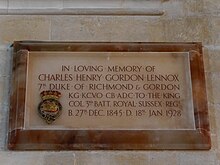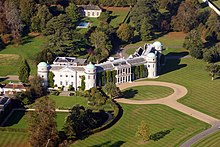Charles Gordon-Lennox, 7th Duke of Richmond

Charles Henry Gordon-Lennox, 7th Duke of Richmond and Lennox, 2nd Duke of Gordon, KG, GCVO, CB (27 December 1845 – 18 January 1928), 7th Duke of Aubigny (French peerage in the French nobility), styled Lord Settrington until 1860 and Earl of March between 1860 and 1903, was a British politician and peer.
Background and education[]



Styled Lord Settrington from birth, he was born at Portland Place, London, the eldest son of Charles Henry Gordon-Lennox, 6th Duke of Richmond and Frances Harriett, daughter of Algernon Frederick Greville. He was educated at Eton between 1859 and 1863. In 1860 he became known as the Earl of March after his father succeeded to the dukedom.[1]
Career[]

Lord March joined the Grenadier Guards two years later, although he retired in 1869 after he was elected Member of Parliament for West Sussex. He represented that constituency until it was abolished for the 1885 general election, when he was returned to the House of Commons for the Chichester constituency. He held his seat until 1889. Around this time, he was appointed as an Ecclesiastical Commissioner, a position he occupied until 1903.
He served in the part-time Royal Sussex Light Infantry Militia, being promoted to Lieutenant-Colonel in command of its 2nd Battalion on 28 June 1876. The regiment became the 3rd (Militia) Battalion of the Royal Sussex Regiment in 1881, and March was appointed its Lt-Col Commandant on 9 July 1887.[2] March and his brother, Lord Algernon Gordon-Lennox, both served in the Second Boer War, with March commanding his battalion in South Africa from its arrival in March 1901 until its return to England in June 1902 following the Peace of Vereeniging. For his service in the war, he was appointed a Companion of the Order of the Bath (CB) in the October 1902 South African Honours list.[3][4][5]
Lord March was appointed Lord Lieutenant of Elginshire on 27 August 1902,[6] and also served as Lord Lieutenant of Banffshire from November 1903, after his father's death.
On 27 September 1903, Gordon-Lennox succeeded his father as 7th Duke of Richmond and Lennox and 2nd Duke of Gordon (2nd creation). In 1904, King Edward VII made him a Knight Grand Cross of the Royal Victorian Order (GCVO) and a Knight of the Order of the Garter (KG). He was Grand Master of the Sussex branch of the Freemasons from 1902.[7] After his retirement from the militia, he was appointed Honorary Colonel of his battalion on 27 May 1906.[2]
The duke died with assets excluding family-entrusted land such as at Goodwood House where he lived (and as his forebears was a parochial and district patron). These were probated at £310,380.[8][9] His interests in the family-entrusted lands were proved at £1731 in 1929.[10] He was buried in Chichester Cathedral.
Family[]
Richmond married firstly Amy Mary Ricardo (24 June 1847 – 23 August 1879), daughter of Percy Ricardo (1820–1892) of at Guildford in Surrey, and his wife, Matilda Mawdesley Hensley (1826–1880), daughter of John Isaac Hensley of Holborn in Middlesex. She was the sister of Colonel Horace Ricardo and of Colonel Francis Ricardo of Cookham in Berkshire. They had three sons and two daughters.[11]
After her death in August 1879, aged 32, he married secondly Isabel Sophie Craven, daughter of William George Craven, in 1882. They had two daughters. Isabel died in November 1887, aged 24. Richmond remained a widower until his death in January 1928, aged 82.
He was succeeded in the dukedom by his eldest son, Charles. Richmond's second son Lord Esmé Gordon-Lennox was a Brigadier-General in the British Army, while his third and youngest son Lord Bernard Gordon-Lennox was a Major in the Army.[1]
Ancestry[]
| showAncestors of Charles Gordon-Lennox, 7th Duke of Richmond |
|---|
References[]
- ^ Jump up to: a b thepeerage.com Charles Henry Gordon-Lennox, 7th Duke of Richmond
- ^ Jump up to: a b Army List, various dates.
- ^ Col George Jackson Hay, An Epitomized History of the Militia (The Constitutional Force), London:United Service Gazette, 1905, pp. 344–5.
- ^ "The Army in South Africa - Troops returning home". The Times (36790). London. 10 June 1902. p. 14.
- ^ "No. 27490". The London Gazette. 31 October 1902. p. 6906.
- ^ "No. 27469". The London Gazette. 29 August 1902. p. 5604.
- ^ "Court News". The Times (36828). London. 24 July 1902. p. 5.
- ^ England and Wales Calendar of Probates, 1928, page 79. National Archives. Also republished at probatesearch.service.gov.uk
- ^ London Probate Registry records for 1928, folio number 805
- ^ England and Wales Calendar of Probates, 1929, page 85. National Archives. Also republished at probatesearch.service.gov.uk
- ^ "Amy Mary Ricardo". The Peerage. Retrieved 18 March 2016.
External links[]
- 1845 births
- 1928 deaths
- Companions of the Order of the Bath
- Dukes of Lennox
- Dukes of Richmond
- Dukes of Gordon
- Earls of March (1675)
- Knights of the Garter
- People educated at Eton College
- Members of the Parliament of the United Kingdom for English constituencies
- Grenadier Guards officers
- Knights Grand Cross of the Royal Victorian Order
- UK MPs 1868–1874
- UK MPs 1874–1880
- UK MPs 1880–1885
- UK MPs 1885–1886
- UK MPs 1886–1892
- UK MPs who inherited peerages
- Lord-Lieutenants of Banffshire
- Lord-Lieutenants of Elginshire
- Sussex Militia officers
- Royal Sussex Regiment officers
- British Army personnel of the Second Boer War
- Burials at Chichester Cathedral
- Freemasons of the United Grand Lodge of England